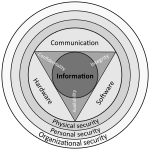Related Research Articles
Malware is any software intentionally designed to cause disruption to a computer, server, client, or computer network, leak private information, gain unauthorized access to information or systems, deprive access to information, or which unknowingly interferes with the user's computer security and privacy. Researchers tend to classify malware into one or more sub-types.

Antivirus software, also known as anti-malware, is a computer program used to prevent, detect, and remove malware.
The European Institute for Computer Antivirus Research (EICAR) was founded in 1991 as an organization aiming to further antivirus research and improving development of antivirus software. Recently EICAR has furthered its scope to include the research of malicious software (malware) other than computer viruses and extended work on other information security topics like content security, Wireless LAN security, RFID and information security awareness. EICAR also organizes international security conferences most years, as well as a number of working groups or 'task forces'.

ClamAV (antivirus) is a free software, cross-platform antimalware toolkit able to detect many types of malware, including viruses. It was developed for Unix and has third party versions available for AIX, BSD, HP-UX, Linux, macOS, OpenVMS, OSF (Tru64), Solaris and Haiku. As of version 0.97.5, ClamAV builds and runs on Microsoft Windows. Both ClamAV and its updates are made available free of charge. One of its main uses is on mail servers as a server-side email virus scanner.
Norton AntiVirus is an anti-virus or anti-malware software product founded by Peter Norton, developed and distributed by Symantec since 1990 as part of its Norton family of computer security products. It uses signatures and heuristics to identify viruses. Other features included in it are e-mail spam filtering and phishing protection.

ClamWin Free Antivirus is a free and open-source antivirus tool for Windows. It provides a graphical user interface to the Clam AntiVirus engine.

Windows Live OneCare was a computer security and performance enhancement service developed by Microsoft for Windows. A core technology of OneCare was the multi-platform RAV, which Microsoft purchased from GeCAD Software Srl in 2003, but subsequently discontinued. The software was available as an annual paid subscription, which could be used on up to three computers.
The GTUBE is a 68-byte test string used to test anti-spam systems, in particular those based on SpamAssassin. In SpamAssassin, it carries an anti-spam score of 1000 by default, which would be sufficient to trigger any installation.
CARO is an organization that was established in 1990 to research and study malware.
Defensive computing is a form of practice for computer users to help reduce the risk of computing problems, by avoiding dangerous computing practices. The primary goal of this method of computing is to be able to anticipate and prepare for potentially problematic situations prior to their occurrence, despite any adverse conditions of a computer system or any mistakes made by other users. This can be achieved through adherence to a variety of general guidelines, as well as the practice of specific computing techniques.

Kaspersky Anti-Virus is a proprietary antivirus program developed by Kaspersky Lab. It is designed to protect users from malware and is primarily designed for computers running Microsoft Windows and macOS, although a version for Linux is available for business consumers.

VirusTotal is a website created by the Spanish security company Hispasec Sistemas. Launched in June 2004, it was acquired by Google in September 2012. The company's ownership switched in January 2018 to Chronicle, a subsidiary of Google.

A computer virus is a type of malware that, when executed, replicates itself by modifying other computer programs and inserting its own code into those programs. If this replication succeeds, the affected areas are then said to be "infected" with a computer virus, a metaphor derived from biological viruses.
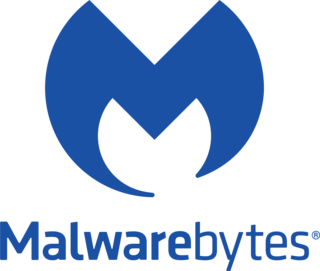
Malwarebytes is anti-malware software for Microsoft Windows, macOS, ChromeOS, Android, and iOS that finds and removes malware. Made by Malwarebytes Corporation, it was first released in January 2006. This is available in a free version, which scans for and removes malware when started manually, and a paid version, which additionally provides scheduled scans, real-time protection and a flash-memory scanner.
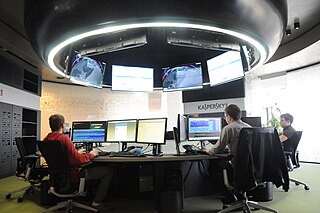
Kaspersky Lab is a Russian multinational cybersecurity and anti-virus provider headquartered in Moscow, Russia, and operated by a holding company in the United Kingdom. It was founded in 1997 by Eugene Kaspersky, Natalya Kaspersky and Alexey De-Monderik. Kaspersky Lab develops and sells antivirus, internet security, password management, endpoint security, and other cybersecurity products and services.
MS Antivirus is a scareware rogue anti-virus which purports to remove virus infections found on a computer running Microsoft Windows. It attempts to scam the user into purchasing a "full version" of the software. The company and the individuals behind Bakasoftware operated under other different 'company' names, including Innovagest2000, Innovative Marketing Ukraine, Pandora Software, LocusSoftware, etc.
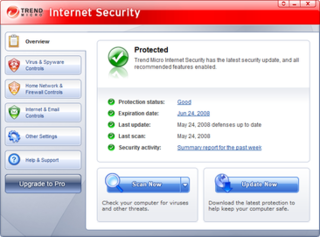
Trend Micro Internet Security is an antivirus and online security program developed by Trend Micro for the consumer market. According to NSS Lab comparative analysis of software products for this market in 2014, Trend Micro Internet Security was fastest in responding to new internet threats.
Eddy Willems, is a Belgian computer security expert and author of security blogs and books, active in international computer security organizations and as a speaker at information security-related events.
ANTI is a computer virus affecting Apple Macintosh computers running classic Mac OS versions up to System 6. It was the first Macintosh virus not to create additional resources within infected files; instead, it patches existing CODE resources.
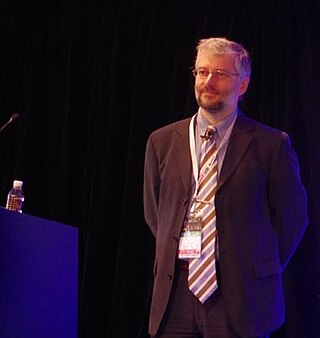
Igor Muttik is a computer security expert, researcher and inventor.
References
- ↑ "Is Your Antivirus Working?". PCMAG. Retrieved 17 April 2017.
- ↑ Hay, Richard (12 September 2016). "How To: Test the SmartScreen Filter and Windows Defender Detection Scenarios". IT Pro Today. Retrieved 3 July 2019.
- ↑ Hess, Ken. "360 Total Security Anti-virus first impressions: Refreshingly subtle but thorough | ZDNet". ZDNet. Retrieved 17 April 2017.
- ↑ "The Use and Misuse of Test Files in Anti-Malware Testing" (PDF). AMTSO. 24 February 2012. Retrieved 3 July 2019.
- 1 2 "AMTSO Security Features Check Tools". AMTSO.
- ↑ Willems, Eddy (June 2003). "The Winds of Change: Updates to the EICAR Test File" (PDF). Virus Bulletin .
- ↑ Willems, Eddy. "EICAR's Test File History" (PDF). Eicar – European Expert Group for IT–Security. Archived from the original (PDF) on 16 December 2015. Retrieved 9 May 2020.
- ↑ "Anatomy of the EICAR Antivirus Test File". NinTechNet's updates and security announcements. 26 August 2021.
- ↑ "EICAR-STANDARD-ANTIVIRUS-TEST-FILE" . Retrieved 21 July 2019.
- ↑ "Virus Profile: EICAR test file". McAfee . Archived from the original on 5 February 2009. Retrieved 9 May 2020.
- ↑ "Download Anti Malware Testfile – Eicar" (in German). Archived from the original on 28 April 2022. Retrieved 22 September 2020.
- ↑ "Exploiting (Almost) Every Antivirus Software – RACK911 Labs".
- ↑ "EICAR test QR".
